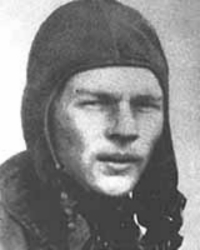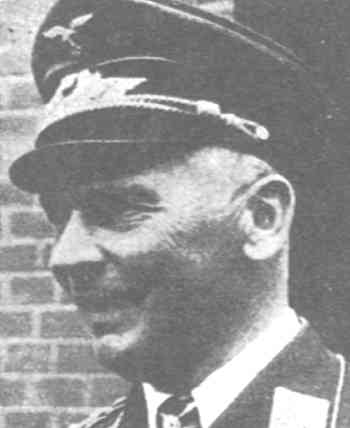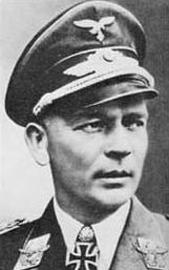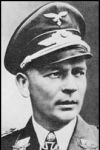October 10, 1895 - July 12, 1945
Wolfram Freiherr von Richthofen was born October 10, 1895 in Gut Barzdorf in Schlesien (Silesia), at the time German territory. He was a son of General der Kavalerie Manfred von Richthofen and a distant cousin of the brothers Manfred and Lothar von Richthofen, two well known aces from the First World War. In 1913, Wolfram followed his father's footsteps and joined the army and became squadron commander in Hussarenregiment 4. of the cavalry. In 1913 he entered Kriegsschule in Kassel and was promoted to Leutnant in 1914 after graduation. He fought in World War One and in September 1917 he was transferred to the Kaiserliche Luftstreitkräfte (Imperial Air Force) at his own request. On April 4 1918, he was posted to Jagdstaffel 11, a squadron his cousin Manfred served in too. Towards the end of the war, Wolfram had shot down eight enemy aircraft, making him an ace. He was also awarded the Eisernes Kreuz II and I (Iron Cross).
On February 29, 1920, Von Richthofen resigned from the air force in the rank of Oberleutnant and on September 18 he married Jutta von Selchow. The couple had three children. Von Richthofen took up a study in engineering, graduating from Technical University Berlin-Charlottenburg in 1924 and made his engineering degree in 1929, netting him the title Dr. Ing.
November 1, 1923, Von Richthofen rejoined the army as a Leutnant in the mountain corps. He was promoted to Oberleutnant in 1925 and to Hauptmann in 1929. Subsequently he served as military attaché in Rome for a few years. October 1, 1933 he decided to be transferred to the air force once again. After a few postings as a Major at the Reichsluftfahrtministeriun, the department responsible for development and production of aircraft, Von Richthofen, meanwhile risen to Oberleutnant, was appointed chief of staff of the Legion Condor in January 1937. This Legion was dispatched to Spain in support of the Nationalist forces during the Spanish Civil War. Hence, Von Richthofen was also closely involved in the bombing of the Bask capital Guernica. After his return from Spain in October 1937 he was promoted to Oberst on January 23, 1938. November 1, 1938 saw him promoted to Generalmajor and he became chief of operations of the Legion Condor.
October 3, 1939, Von Richthofen was appointed commander of VIII Fliegerkorps. This unit supported the operations in the Netherlands, Belgium and France in connection with Fall Gelb. Due to the success of this operation, he was awarded the Ritterkreuz (Knight's Cross) on May 17, 1940. July 1940, shortly after the beginning of the Battle of Britain, he was promoted to General der Flieger.
Early 1941, VIII Fliegerkorps was transferred to Romania for the invasion of Yugoslavia and Greece in April. Here, Von Richthofen was directly responsible for the heavy bombardment on Belgrade during which the city was destroyed and 17,000 civilians killed. After the war, his commander, Generaloberst Alexander Löhr was to be executed for this by the Yugoslavs. In May 1941, the corps carried out air raids on Crete, turning the buildings in Chania and Heraklion, dating back to the Venetian period, to rubble.
In June, the operations on the Balkans and in Greece had also been completed successfully and on July 17, 941, Von Richthofen was awarded the Eichenlaub (Oak Leaves) to his Ritterkreuz. February 1, 1942, he was promoted to Generaloberst and in March, the corps was transferred to the Eastern Front and from March 20 onwards, the corps supported the operations of Heeresgruppe Mitte (Army Group Center) but from April onwards, the corps operated in the southern sector of the front. From May onwards, the corps supported the operations against Sebastopol on the Crimea. Early July, these attacks reached a climax and the corps was responsible for a massive bombardment on the city itself. This cleared the way for the troops of 11. Armee, commanded by Generaloberst Erich von Manstein (Bio Von Manstein) who captured the city on July 4. The very same day, Von Richthofen was appointed Commander-in-Chief of Luftflotte 4 and he remained in support of the operations in the southern sector of the front with this corps. Here he was also responsible for the heaviest bombardment of the battle at the Eastern Front so far, the bombing of Stalingrad on August 23, 1942. The bombers of Luftflotte 4 flew 2,000 sorties over the city that day and continued bombing the city for a week, claiming the lives of an estimated 40,000 civilians.
Von Richthofen's reputation of mercilessness had now overtaken him. The intelligent man with the stern facial expression had been directly responsible for the horrendous bombings of Guernica, Belgrade, Crete and Stalingrad.
6. Armee, commanded by General der Panzertruppen Friedrich Paulus (Bio Paulus), charged with the capture of Stalingrad, was unable to capture the city however. Von Richthofen wrote in his diary: "The Russians are sending in reinforcements from all directions." He could not hide his impatience to capture the city. He urged Paulus to make better use of his air support. "Use today's day," he wrote, "I cannot offer you this tomorrow." On August 25, an intolerant Von Richthofen spoke to a nervous Paulus again. He pressed him again for a quick victory at Stalingrad now the Soviet troops were still weak. Von Richthofen's bombings had not broken the spirit of the enemy however, on the contrary, they had turned the ruined city into a perfect defensive position for the Soviet troops.
Early November, Soviet troops began assembling on the flanks of 6. Armee. Reconnaissance aircraft of Von Richthofen's Luftflotte 4. had already spotted these troops, it was just a question of waiting for the counter-attack to begin. When it started on November 19, rain and hail prohibited attacks from the air. The Axis forces were soon encircled and Von Richthofen's Luftflotte 4. was ordered by Reichsmarschall Herman Göring (Bio Göring) to resupply the encircled troops by air. Von Richthofen countered immediately by arguing he had an insufficient number of aircraft at his disposal but Göring was unreachable. The lack of a sufficient number of aircraft, supply lines being way overstretched, the bad weather, few air fields and poorly trained ground crews caused the air lift to turn into a disaster. On January 10, 1943, the Soviet armies launched their last offensive against the ever shrinking pocket. 6. Armee surrendered on January 31: 530,000 Axis soldiers had been killed during the battle for Stalingrad and 130,000 made prisoners-of-war.
Following the battle of Stalingrad, Von Richthofen was promoted to Generalfeldmarschall on February 16, 1943; at 47 the youngest ever in German and Prussian military history. On June 26, he was given command over Luftflotte 2 operating in the Mediterranean theatre. On October 27, 1944 he fell ill and went on sick leave. In November he was transferred to the reserve, never to be given a command again.
Before and after the war, Von Richthofen was awarded various German, Romanian and Spanish decorations. He was made a prisoner-of-war by American troops after the war. Dr. Ing. Wolfram Freiherr von Richthofen died in captivity July 12, 1945 at the age of 49 from a brain tumor.
Read more about the decorations of this person on TracesofWar.com
Definitielijst
- cavalry
- Originally the designation for mounted troops. During World War 2 the term was used for armoured units. Main tasks are reconnaissance, attack and support of infantry.
- Eisernes Kreuz
- Iron Cross. German military decoration.
- First World War
- Took place from 1914 till 1918 and is also named The Great War. The conflict started because of increased nationalism, militarism and neo-colonialism in Europe. Two alliances battled one another during the 4-year war, which after a dynamic start, resulted into static trench warfare. The belligerents were the Triple Alliance (consisting of Great-Britain, France, and Russia; later enlarged by Italy and the USA, amongst others) on the one hand and the Central Powers (consisting of Germany, Austria-Hungary, Bulgaria and the Ottoman empire) on the other hand. The war was characterized by the huge number of casualties and the use of many new weapons (flamethrowers, aircraft, poison gas, tanks). The war ended in 1918 when Germany and its allies surrendered unconditionally.
- Heeresgruppe
- The largest German ground formation and was directly subordinate to the OKH. Mainly consisting of a number of “Armeen” with few directly subordinate other units. A Heeresgruppe operated in a large area and could number several 100,000 men.
- invasion
- Armed incursion.
- Iron Cross
- English translation of the German decoration Eisernes Kreuz.
- offensive
- Attack on a smaller or larger scale.
- Spanish Civil War
- Fierce and cruel civil armed conflict in Spain from 1936 to 1939 between left (from anarchic to liberal) and right (church, nobility and army). In 1936 the fascist-oriented general Franco started military uprisings. With the help of Hitler and Mussolini he beat the republicans who vainly were supported by the International Brigade.
- squadron
- A military unit in the Belgian navy usually six to eight small ships operating together under one command. The smallest military unit in the Dutch air force of about 350 men. In most countries is the designation of a military unit thesize of a company. It is either an independent unit, such as a battery, or part of a bigger Calvary unit. In the air force it is the designation of a unit of aircrafts.
Images
 Leutnant Wolfram Freiherr von Richthofen in the First World War. Source: http://www.wopmay.com.
Leutnant Wolfram Freiherr von Richthofen in the First World War. Source: http://www.wopmay.com. Generalfeldmarschall Dr. Ing. Wolfram Freiherr von Richthofen. Source: http://www.ww2photo.mimerswell.com.
Generalfeldmarschall Dr. Ing. Wolfram Freiherr von Richthofen. Source: http://www.ww2photo.mimerswell.com.Information
- Article by:
- Auke de Vlieger
- Translated by:
- Arnold Palthe
- Published on:
- 19-01-2025
- Feedback?
- Send it!
Sources
- Axis Biographical Research
- Wikipedia
- Wolfram von Richthofen











